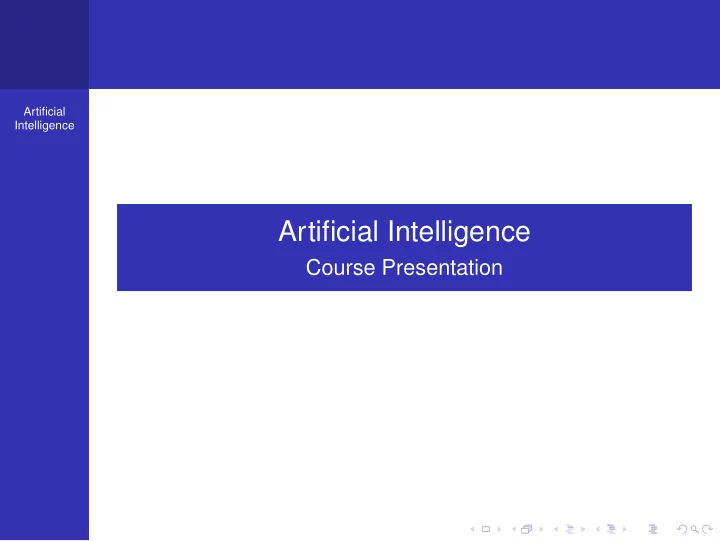

Artificial Intelligence Artificial Intelligence Course Presentation
Summary Artificial Intelligence Motivations Course Plan Resources Exam Methods
Motivations Artificial Intelligence Artificial Intelligence: Machines that think and act like humans do Voight-Kampff test in blade-runner
Motivations Artificial Artificial Intelligence: Intelligence Machines that solve complex problems Google Self Driving car
Related areas Artificial Intelligence AI highly interdisciplinary Probability and Statistics Robotics Logics Algorithms Game Theory Pattern Recognition and Machine Learning Key distinctive element: Interaction with the environment
Practical applications: Overview Artificial Intelligence Agile manufacturing Service Robots Environmental monitoring Games, entertainment and education Medical Diagnosis Hardware/Software Verification Search and Rescue operations Smart Transportation Smart energy Management ...
Agile Manufacturing: The Kiva robots Artificial Intelligence Coordinate movements of a large number of robots for indoor logistic operations
Service Robots: Cleaning robots Artificial Intelligence Robots that can help for daily activities
Service robots: robot companions Artificial Intelligence Robot that can interact with humans and assist them in various tasks
Environmental Monitoring: Water Monitoring Artificial Intelligence Autonomous drones for water quality monitoring
Planning and situation awareness for drones Artificial Analyse data coming from sensors to understand the Intelligence situation and decide what is the best possible action
Water Monitoring: perception for autonomous behaviors Artificial Intelligence Use computer vision to detect relevant features and situations
Entertainement, Games and education: robocup Artificial Intelligence Robots that play football autonomously
The long and winding road to AI... Artificial Intelligence ...is full of epic failures!
Course Plan I Artificial Intelligence Problem Solving: Search (about 6 lessons) Uninformed search (Breadth first, Depth First, Iterative Deepening, etc.) Informed Search (A*, Heuristics, Local Search and Optimization) Constraint Processing (CSP , COP) (about 6 lessons) Contraint Satisfaction Problems, Constraint Network and Graphical models Basic techniques for CSP (Consistency enforcing, Local Search) Tree-Decomposition (Dynamic Programming) Constraint Optimisation Problems
Course Plan II Artificial Intelligence Probabilistic Reasoning (about 8 lessons) background on Probability Markov Decision Processes Reinforcement Learning Deep Reinforcement Learning Programming laboratory (about 6 lessons) Implement state-space search techniques Implement solution techniques for Markov Decision Processes Implement solution techniques for Reinforcement Learning and Deep Reinforcement Learning
Text books: Main Reference Artificial Intelligence Artificial Intelligence: a modern approach (3rd Editon); Stuart Russel and Peter Norvig (English edition)
Text books: Constraint Processing Artificial Intelligence Constraint Processing; Rina Dechter
Text books: Reinforcement Learning Artificial Intelligence Reinforcement Learning: an introduction (2nd Edition); Richard S. Satto and Andrew G. Barto
Resources: other material Artificial Intelligence Scientific Papers, Slides, etc. Will be available on moodle and on course web site Web Page link
Exam modalities Artificial Intelligence Oral test 1 oral test on topics studied during the course (including the programming lab); exercises and questions to evaluate the level of comprehension of the topics covered during the course. 2 oral test on a specific project assigned by the teacher (and on the programming lab). presentation of the project (see next slides) plus questions. Programming lab: questions to assess the level of understanding of the delivered software (see next slides).
Projects Artificial Intelligence Project Instructor will propose a set of projects; Students can: choose among the set of proposed projects or propose other projects; Projects proposed by students must be validated by the instructor; Projects usually involve a programming part (in the language most appropriate for the project); Students will present the project during the oral test and deliver the developed code; Possible Project Ideas Ask for more info if interested.
Programming Lab Artificial Intelligence Goal: hands on exercise for key topics (state space search, MDPs, RL, DRL); Based on a public available platform to develop AI projects (OpenAI); Instructor will describe the exercises, student will implement the software; Tutor will help students to develop the code; Questions during oral test to assess level of comprehension of the delivered code.
Recommend
More recommend